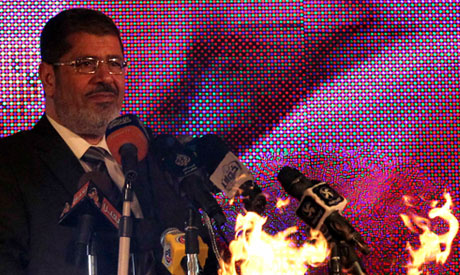 Mohamed Mursi, the Muslim Brotherhood's candidate in the ongoing presidential elections, tried to appeal to disgruntled revolutionaries in an enthusiastic speech on Saturday night.
Mohamed Mursi, the Muslim Brotherhood's candidate in the ongoing presidential elections, tried to appeal to disgruntled revolutionaries in an enthusiastic speech on Saturday night.
The Freedom and Justice Party (FJP) leader is set to face former prime minister Ahmed Shafiq in a decisive run-off next month as both men vie to become the first post-Hosni Mubarak president.
The pro-democracy activists who staged massive protests in January 2011 to topple autocratic president Mubarak are licking their wounds after none of their favourite candidates made it through to the runoff, with leftist Hamdeen Sabbahi and moderate Islamits Abdul-Moneim Abul-Fotouh coming third and fourth respectively in the first round.
Many fear a possible win for Mursi will strengthen the Brotherhood's stranglehold on the country after the organisation, long oppressed under Mubarak and predecessors Gamal Abdel-Nasser and Anwar Sadat, swept the parliamentary elections earlier this year.
"Our goals are the same, our path is the same. All of us seek stability, democracy and freedom. We also share the aim of stamping on remnants of the corrupt regime," he told a news conference on Saturday night.
"Within few days, we will form a united front against the dismantled regime. I'm sure the revolution will emerge triumphant from the runoff.
"Today's presence of many political figures clearly shows that we can move forward and confront those who are trying to derail the revolution," he added after attending a meeting involving many figures as the Brotherhood attempts to garner sufficient support before the runoff.
Many revolutionaries are still undecided over whether to support Mursi or boycott the elections. Although Shafiq is their bitter foe, given his role as a Mubarak aide during the 18-day uprising, they are still reluctant to vote for Mursi, fearing that the Brotherhood may monopolise power, implement Islamic (Sharia) law and curb personal and artistic freedoms.
Mursi, who is running for president on the Brotherhood's "Renaissance Project", tried to quell worries among supporters of the revolution who might be weary of the Brotherhood control of various branches of government by stressing that they will be open to any cooperation from other forces if they assume power.
"There will be a coalition government and the presidency will not rely on an individual," he said.
"The constituent assembly [to write a constitution] will include all segments of the Egyptian society and the constitutionwill be representative of all Egyptians. It will be the first time that the citizens themselves write their constitution."
"All the other presidential candidates can also contribute to the Renaissance Project. We will always work in the best interests of the great Egyptian people."



